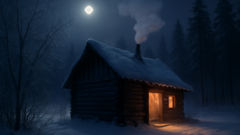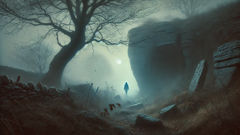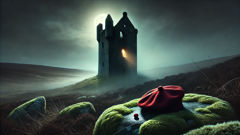Introduction
Steam swirled beneath the frosted eaves of the wooden banya, curling in ghostly ribbons that clung to the shadows of the forest. The small Russian village of Malenki, huddled at the edge of a wild, whispering woodland, had stood for centuries—its simple cottages and mossy roofs bowed under the weight of snow and history alike. Here, the banya was more than a bathhouse. It was a sanctum: a place where life and death, healing and mystery, mingled in the hush of birch switches and the hiss of water on glowing stones. Every villager, from the stooped babushka to the youngest swaddled babe, understood that the banya belonged to another realm as much as to their own. It was said that within its timbered heart lived the Bannik, a spirit older than memory, as capricious as the wind and as sharp as the sting of steam on bare skin. Some whispered that the Bannik could glimpse the threads of fate, offering warnings or blessings to those bold or desperate enough to seek its counsel. Others told darker tales: of careless bathers who mocked the rituals or lingered too long, only to vanish, their voices drowned in scalding mist. For all its warmth, the banya demanded respect—a respect born not just of tradition, but of fear. And so, on the eve of Ivan Kupala, when the air buzzed with magic and the boundary between worlds thinned, the villagers lit fresh birch logs in the banya stove, scattered rye and salt upon the threshold, and crossed themselves before entering. Tonight, a young woman named Anya would slip into that steamy hush, not for comfort or cleansing, but in search of a truth only the Bannik could provide. The fate of her family—and perhaps the whole village—would depend on what she found in the shifting shadows, where breath and spirit entwined.
The Keeper of Steam
Anya’s heart drummed in her chest as she stood before the banya door. The timbers, darkened by decades of smoke and steam, were slick with frost, yet the warmth radiated from within. Her mother’s warning echoed: Never enter alone after midnight. But tonight, superstition bent beneath the weight of need. Her father lay feverish, his breaths ragged, and the village healer’s remedies had failed. There was talk that the fever wasn’t of this world, but of a curse—something that only the unseen could undo.

Anya hesitated, clutching a fresh loaf of black bread and a pinch of salt—offerings for the Bannik. The moon, shrouded in thin cloud, cast a blue-grey hush over the yard. She glanced behind her: not a soul stirred; even the dogs slept on their paws. With trembling fingers, she knocked once, twice, three times—a number believed to open doors between worlds. The door creaked open on its own, and a wave of moist heat swept over her, beading her brow with instant sweat. For a moment she considered turning back, but the thought of her father’s burning skin spurred her on.
Inside, the banya pulsed with life. Birch branches dangled from the rafters. Buckets of cool water lined the walls. The stove—a hulking, soot-black beast—glowed in the corner, stones stacked atop it like the bones of some ancient creature. Shadows moved in ways that defied logic, stretching and coiling as if alive. Anya placed her offerings on the threshold, bowing her head in silent prayer. A hush fell; even the crackle of the stove seemed to hold its breath. The air grew thick, suffocating. Anya gasped, wiping her brow. The mist swirled faster, coalescing into a shape—almost human, but shifting, fluid, its features ever-changing. Two eyes, black as obsidian, watched her from within the steam.
A voice, old as the stones and soft as falling snow, whispered through the vapor. “Why do you disturb my solitude?” it asked. Anya knelt, hands trembling. "Please, Bannik. My father is dying. They say he is cursed. I beg you—show me how to save him. I’ve brought bread and salt." The spirit’s gaze lingered on the offerings. A long silence stretched between them. Then, without warning, the Bannik reached out—a hand like smoke brushing Anya’s cheek. Her vision blurred. Images flooded her mind: her father as a young man, a shadowy figure passing through the village, a dried root pulled from beneath the banya’s stones. The spirit’s words seeped into her bones: “To break the curse, you must return what was taken.”
The air snapped back to normal. Anya collapsed to her knees, gulping fresh air. The Bannik’s form dissolved into the shadows, but the message remained. She staggered outside, clutching at the memory of the vision—a root, gnarled and black, hidden beneath the very stones that warmed the village. The path forward was perilous, for not all in Malenki believed in making peace with the unseen. But Anya’s resolve, now tempered by fear and hope, would not falter.
Beneath the Stones
Dawn crept across the village, casting long blue shadows over the snow. Anya returned home just as the first roosters called. Her mother’s eyes widened at the sight of her soot-streaked cheeks and tangled hair. She tried to explain: the vision, the root, the Bannik’s warning. Her mother listened in silence, worry furrowing her brow. "If what you saw is true," she said at last, "then we must act before the sun sets again."
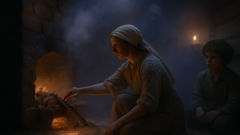
With her younger brother Ivan in tow, Anya hurried to the banya. The stove’s stones—ancient, smooth, and dark with years of sweat and steam—seemed almost to pulse beneath her fingers. Each one was heavier than it looked, and it took all their strength to move even the topmost rocks. Beneath them, nestled in a bed of ash and grit, Anya found it: a root, twisted and black, as hard as iron and cold despite the warmth above. She remembered the vision: her father, years ago, digging for kindling and unearthing something strange. He’d kept it as a curiosity, never suspecting it might offend the spirit who watched over them all.
As Anya grasped the root, a rush of cold wind swept through the banya—impossible with all doors closed. Ivan shivered, clinging to her arm. “We should put it back,” he whispered, his eyes wide. Together, they carried the root to the threshold, setting it gently on the stones. Anya scattered a circle of salt around it, then bowed her head. "Bannik, we return what was taken. Forgive our ignorance." The stove let out a long sigh—a hiss as water might sound on hot rock, but softer, almost a wordless note of thanks. The air lightened. The root began to crumble, breaking down into ash before their eyes. Ivan gasped. The banya seemed to breathe.
That night, Anya’s father’s fever broke. He awoke weak but smiling, and the healer declared it a miracle. Word spread through the village, sparking both awe and unease. Some praised Anya’s courage; others muttered that no good could come from meddling with spirits. Yet the banya stood unchanged, its walls holding warmth—and secrets—as they always had. As days passed, Anya noticed something new: when she entered the banya, the steam felt gentler. The birch switches left a cleaner scent. Old aches faded faster from tired limbs. It was as though the Bannik had accepted her family’s apology, and the banya’s blessings had returned.
The Price of Wisdom
With her father well again, Anya’s relief was short-lived. Word of her encounter with the Bannik spread beyond Malenki, reaching neighboring villages and even the district priest. Some were fascinated—clamoring for Anya to intercede with the spirit on their behalf. Others were frightened or envious. Soon, she was beset with requests: a lost cow, a missing child, a field blighted by frost. Each time she entered the banya with offerings, the steam would rise and shift. Sometimes the Bannik answered with riddles or visions; sometimes there was only silence.
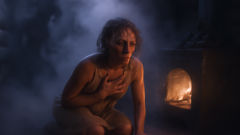
But every visit left Anya more exhausted. The Bannik, she realized, was not to be summoned lightly. Its wisdom came at a price—sometimes confusion, sometimes fear, always the risk of angering a spirit whose patience was finite. One night, when the moon was new and the forest was restless with wind, Anya entered the banya with a bundle of flax for a woman desperate to know her son’s fate in the distant wars. She placed the offering and knelt, but the mist grew so thick she could barely breathe. The air pressed in, heavy and damp. For a moment, she thought she saw a face—her own, reflected in the sweat-dark planks—twisted with sorrow.
A voice, harsher than before, echoed: "You seek too much. The future is not for mortal eyes to command." The steam boiled around her. Anya struggled to stand, her lungs burning. The shadows writhed at the edge of her vision. "Forgive me," she whispered, "I meant no harm." The pressure eased, and the steam thinned. She fled outside, collapsing in the snow. The lesson was clear: the Bannik’s favor was not endless; its patience could turn to wrath if misused.
From that night onward, Anya visited the banya only for cleansing and rest. She warned others to respect the spirit, to seek wisdom only in dire need and never out of curiosity or greed. Slowly, peace returned to Malenki. The banya’s warmth became a symbol of both comfort and caution—a place where villagers remembered to leave gifts of bread and salt, and to whisper thanks into the swirling steam.
Conclusion
Years passed, and Anya grew into a wise woman—respected for her knowledge and humility. She married and raised her children in Malenki, teaching them the old ways: how to honor the banya, when to make offerings, and how to sense when wisdom was best left unasked. The legend of the Bannik remained alive in every whispered story by the stove and every hush that fell when steam hissed just so on hot stone. Some said that on certain nights, if one listened carefully in the thickest steam, one might hear an ancient spirit humming a lullaby older than any living memory.
The village flourished, its people healthier and more content than most. They credited this good fortune to their respect for the Bannik and for each other—a delicate balance between fear and gratitude that shaped their lives as surely as the seasons. And while outsiders sometimes scoffed at tales of spirits and visions, those who lived closest to the banya knew better. They understood that not all wisdom could be demanded; some must be earned, some endured, and some simply accepted with a grateful heart.
So it was that the banya remained both refuge and mystery—a bridge between worlds where steam concealed secrets, softened grief, and reminded all who entered that the line between seen and unseen is thinner than a breath on a winter’s night.

